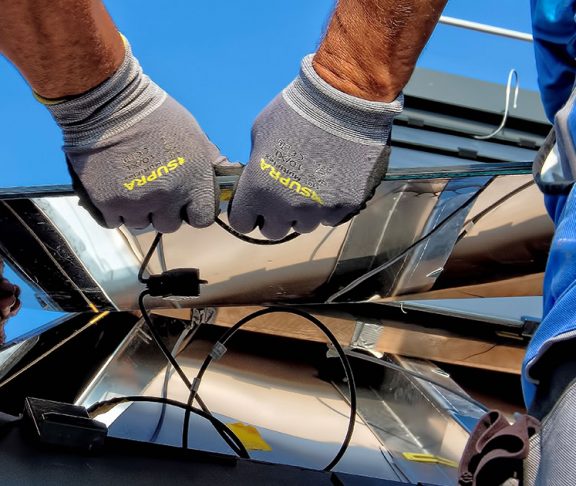
Abigail Ross Hopper
President and CEO, Solar Energy Industries Association (SEIA)
Did you know that every 100 seconds, someone in America chooses to go solar. There are now more than 2 million solar installations in the United States, and that number continues to grow. The energy landscape has changed dramatically in the past few years, making solar an affordable, reliable electricity option.
Solar comes in all shapes and sizes, from large solar plants in the middle of deserts, to corporations powering their warehouses and stores with solar energy.
Many homeowners can achieve the benefits of solar energy through rooftop solar panels, which cost a fraction of what they did 10 years ago. Renters can also take advantage of solar by switching their electricity supplier through their utility company or by using community solar, a program where multiple households benefit from one larger solar project.
Consider this
As more families go solar, consumers need to consider several key points.
First, homeowners should look at their own electricity usage and anticipate any upcoming changes in electricity consumption, like purchasing an electric vehicle. Consumers thinking about an installation should talk with local solar companies to discuss their specific needs. The good news is that solar costs have dropped by more than 70 percent since 2010, which has made going solar more feasible for homeowners in a variety of financial situations.
Second, you don’t have to live in the South or Southwest to benefit from solar. Northern states like New York and Massachusetts may not be the sunniest, but they are leading the way in solar, primarily because of strong policy and solar’s ability to deliver savings on electricity costs.
Third, Americans considering solar for their home should take time to understand their payment options and the current tax incentives available. Customers can purchase a solar system outright, lease a system from a solar company, or enter into an agreement to purchase the actual units of electricity generated from the system. Businesses looking to invest in rooftop solar systems or larger, off-site solar systems also have a variety of financing options and can benefit from available incentives.
Think before you buy
As with any major financial decision, buyers should comparison shop and explore prices in their area. There are an increasing number of installers entering the solar market. The majority of these companies are committed to operating under the highest standards, however, consumers should still do their research, seek out references, and ask for proof of licensure.
For homeowners purchasing a solar installation, the solar Investment Tax Credit (ITC) provides a 30 percent tax credit through the end of 2019. Although the ITC is set to begin phasing out next year, a bipartisan bill was recently introduced in Congress to extend the program, which has helped to create 200,000 jobs and spark $140 billion in private investment.
Solar energy can save consumers thousands of dollars on their electric bill over the lifetime of the system and contribute to cleaner air and fewer greenhouse gas emissions. Similarly, corporations and utilities are also choosing to go solar because it makes economic sense and their customers are demanding it.
Thanks to innovation, solar-friendly policies, and falling costs, solar is available to more people today than ever before, but choosing solar remains a big decision. Consumers who consider these key questions will be more informed and able to make a decision that best meets their energy needs.
Question and answer with SEIA president and CEO Abigail Ross Hopper
What are the top myths surrounding the renewables industry you’d like to debunk for our readers? Anything specific to the solar sector?
Myth: Solar energy costs too much. Fact: While a solar installation is certainly an investment that requires thoughtful planning, the truth is that costs are declining and are down more than 70 percent in the past decade. Utilities and corporations are also increasingly investing in their own solar assets.
Myth: A warm, sunny climate is necessary for solar installations. Fact: Solar is a popular option for most U.S. homeowners and businesses. The best first step is to talk with neighbors who are already using solar and contact local companies that do installations. They can tell you firsthand what it’s like to go solar.
Myth: Solar is only for homeowners. Fact: Solar energy is an efficient and reliable electricity source, regardless of whether you rent or own a home or business. For renters, community solar programs are one way to use solar energy. Renters can also take advantage of programs that allow energy consumers to work with their utility to choose a supplier that uses renewable energy.
What type of improvements to local solar practices could benefit both businesses and homeowners?
Streamlined permitting and interconnection practices at the state and local level can dramatically reduce how long it takes to connect a solar energy system to the grid. When businesses and homeowners can connect to the grid faster, that means that they’re able to start benefiting from their systems faster.
They can also benefit from tax incentives; state and local renewable portfolio standards that accelerate the utility transition to clean energy; and other policies that level the playing field for renewable energy in U.S. electricity markets.
Over the next five to 10 years, how do you foresee solar being used by businesses and homeowners?
Everyone benefits when companies choose solar to power their business operations. Today, there are seven gigawatts of corporate solar installed across 35,000 installations, and corporate solar deployment is 23 times larger today than it was a decade ago. This number will continue to grow, especially if Congress chooses to extend the widely popular solar Investment Tax Credit, known as the ITC, which has broad, bipartisan support. Solar installations are projected to double by 2023 and we could see even greater deployment if the tax credit gets extended.
The solar industry has also set a bold goal to have solar energy comprise 20 percent of all electricity in the country by 2030. America’s largest brands, small businesses, and individual homeowners can enjoy the financial and environmental benefits of renewable energy while also helping to reach this goal.
Which demographics have adopted solar more than others? Why do you think this is?
Rapid cost reductions and increasing availability of solar energy across the country have made solar installations an option for more people in more places than ever before. For those who do not own their home and still want to enjoy the benefits of renewable energy, community solar programs have expanded access for everyone, including low-to-moderate income customers.
Through 2018, more than 1,300 megawatts of community solar have been installed in the United States, enough to power nearly 250,000 homes. Over the next several years, U.S. community solar programs are poised to add as many as three gigawatts of installed solar capacity.
Is there any specific reason why solar and other renewables have not been more universally adopted? How can we combat these problems?
New industries and technologies take time to develop. The good news is solar energy continues to gain traction as a low-cost and reliable electricity solution. With more than 2 million installations now online and an expanding array of career opportunities, solar energy is an American success story.
To continue this progress, solar needs to be made available to people in all regions and financial situations. Policymakers should also support legislation, such as the ITC, that grows solar, improves our environment, and supports new career opportunities.
Abigail Ross Hopper, President and CEO, Solar Energy Industries Association (SEIA), [email protected]

